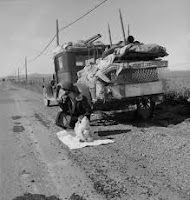Today, according to Greenpeace, the chances of a sudden natural disaster
are 60 percent higher than they were forty years ago. On average, 25.4 million people are forced from their homes every year due to some sort of natural disaster.
One of the biggest examples of climate change migration in American history is the Dust Bowl, which took place from 1930 to 1936, where more than 300,000 people moved to California to try and find work. During this time, the migrants were treated as outcasts by their fellow Americans. Law enforcement applying their status to use unnecessary brute force against the migrants,
California natives loading guns against their fellow countrymen,
simply because they didn't approve of the "Okies," etc. If you have ever read "The Grapes of Wrath," you know of the Joad family. They faced many challenges, ranging from hunger to familial separation, death, and mistreatment of those who lived in California.
We as Americans are raised to believe we are free. Free to choose what we want in life; Free to make our own choices; Free as people and united as one.
This past year (2017), the U.S. had four hurricanes make landfall, when, on average, we experience five storms making landfall over the course of three years. Even within the past month, Hurricane Florence made landfall, resulting in at least 32 confirmed deaths and 1.7 million people displaced due to evacuations.
How do you think we should react to this? How do you think you would feel, or act, if millions of refugees migrated to your hometown because theirs was destroyed?
Think of it this way: according to this Huffington Post article, it was concluded in a study last year that if the sea-level was to rise by 6 feet, it would cause every U.S. state to experience climate-related migration and 13 million Americans would be forced to move inland.
What would you do when this happens?
are 60 percent higher than they were forty years ago. On average, 25.4 million people are forced from their homes every year due to some sort of natural disaster.
One of the biggest examples of climate change migration in American history is the Dust Bowl, which took place from 1930 to 1936, where more than 300,000 people moved to California to try and find work. During this time, the migrants were treated as outcasts by their fellow Americans. Law enforcement applying their status to use unnecessary brute force against the migrants,
California natives loading guns against their fellow countrymen,
simply because they didn't approve of the "Okies," etc. If you have ever read "The Grapes of Wrath," you know of the Joad family. They faced many challenges, ranging from hunger to familial separation, death, and mistreatment of those who lived in California.
We as Americans are raised to believe we are free. Free to choose what we want in life; Free to make our own choices; Free as people and united as one.
This past year (2017), the U.S. had four hurricanes make landfall, when, on average, we experience five storms making landfall over the course of three years. Even within the past month, Hurricane Florence made landfall, resulting in at least 32 confirmed deaths and 1.7 million people displaced due to evacuations.
How do you think we should react to this? How do you think you would feel, or act, if millions of refugees migrated to your hometown because theirs was destroyed?
Think of it this way: according to this Huffington Post article, it was concluded in a study last year that if the sea-level was to rise by 6 feet, it would cause every U.S. state to experience climate-related migration and 13 million Americans would be forced to move inland.
What would you do when this happens?


these ideas are super worrying, the idea of losing that much coastline in my lifetime is very troubling
ReplyDelete6 feet is all we have to work with? That is terrifying. If that sea level does rise I think a lot of people are going to be feeling bad about how they previously treated climate refugees. Perhaps it will shine some light on the issue and make them a little more willing to offer help the next time refugees come moving into their territory? Sometimes it takes experiencing a tragedy for people to feel remorse.
ReplyDeleteWhat an interesting question at the end? It is a really hard thing to think about. I would hope that everyone would help out the people moving into Michigan if this was to happen. But with how the world is today I am sad to say that many people would most likely not be as understanding. Super scary thoughts and insane to think about.
ReplyDeleteWhile in the novel people were not as openminded with migrants entering their town, I'd sincerely hope that people would not be so unkind today. Definitely something to think about!
ReplyDeleteI really like how you said "when" as opposed to "if". It's very powerful, in my opinion, and it reinforces the idea that this will happen, and it's only a matter of time.
ReplyDeleteSadly, I don't think many people will care about climate related immigration/migration until it happens directly to them or the ones they love. I sincerely hope that it doesn't come to such extremes before the people in this country start caring about climate change and the people who are directly effected by it.
ReplyDeleteI really liked the article from Huffington Post; makes it more real. And I suspect their number are way too low!
ReplyDelete